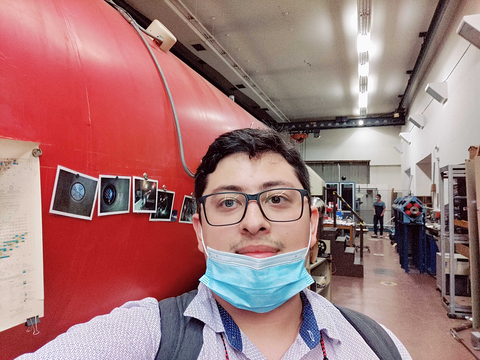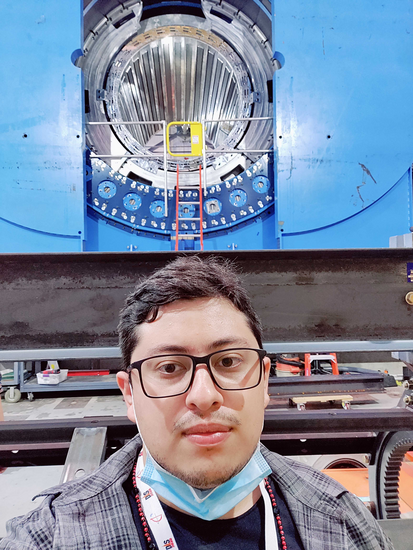An undergraduate student at UC Riverside won an award at the very first scientific conference he attended.
Luis Garabito, 22, gave a presentation in the short-talk category at the Electron-Ion Collider Group Meetingat Stony Brook University in New York on “polishing wave-length shifting fibers and prototyping a particle detector for the future Electron-Ion Collider.” His talk was judged the best in the category.
The Electron Ion Collider, or EIC, is a planned major nuclear physics research facility at Brookhaven National Laboratory in Upton, New York, that will explore mysteries of the “strong force” that binds the atomic nucleus together.

“By successfully prototyping a working particle detector, we can implement it into the real EIC in the future,” said Garabito, who transferred to UCR from Norco College and will be a senior this fall. “My work primarily focuses on working with the wave-length shifting fibers and the wave-length shifting bars, also known as scintillating fibers and scintillating bars. These materials help us detect photons, which can help us understand the energy deposited by a particle hitting the detector.”
Garabito, who is originally from Guatemala and grew up in California, constructed a cosmic ray detector and conducted experiments to detect cosmic rays.
“If successful, we will be able to proceed by making a larger version of this detector,” he said.
When he won the best talk award in the short-talk category, Garabito was initially confused, not expecting to win.
“It was very unexpected but also amazing,” he said.
Just as amazing to him was being able to travel for physics-related work.
“The experience was surreal because I never expected to travel,” Garabito said. “The top three memorable moments were arriving in New York for the first time, getting to see the research facility at Brookhaven National Laboratory, and winning the award for the best short talk. Another important experience was meeting physicists from around the world.”
The conference left strong impressions on Garabito. He believes he will never forget how the work that will be carried out for the EIC will affect not only the current scientists, engineers, and physicists but also future generations of them.

“This project is a collaboration with many scientists across the world and the U.S.,” he said. “Science is no longer individual science but based on teamwork involving the best and brightest.”
Garabito joined UCR in the fall of 2021. He came to the United States when he was five years old and is a first-generation student. At UCR he works in the lab of Miguel Arratia, an assistant professor of physics and astronomy, and is supported by a U.S. Department of Energy traineeship grant aimed at providing research opportunities for students from disadvantaged backgrounds. The grant is led by UCR in collaboration with Lawrence Livermore National Laboratory, Lawrence Berkeley National University, UCLA, and Cal Poly Pomona.
“It takes a lot of effort to convey the big picture of a research project and present results in a short talk,” Arratia said. “Luis did a great job doing it. His talk was engaging, and his high motivation was evident. It is also remarkable that it was his first research conference.”
At the EIC Group Meeting, Garabito also participated in an early-career workshop that introduced him to numerous topics in nuclear and particle physics that are still being worked on.
“There are so many questions about particle physics that we have yet to answer,” he said. “The workshop also helped me understand that there are many opportunities for new physicists to get involved in research. There is now a concentrated effort to get more scientists to work with the EIC and in particle physics. The workshop helped me come out of my comfort zone by making me meet new people and give a presentation.”
Hoping to graduate with a bachelor’s degree in physics within a year, Garabito plans to pursue a doctoral degree in particle physics or in a different field in physics. His advice to students preparing to attend their first conference is to talk to people, especially those in charge of the conference and high-profile scientists.
“And don’t worry about not understanding the material being covered,” he said. “Enjoy the experience and remember that as you continue in this field answers will come. Something you don’t understand right now will make sense down the line.”